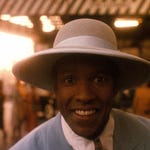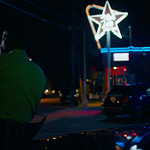Dear friends,
Around a third of the way through Stanley Kramer’s “ultimate comedy”, enraged everyman Jonathan Winters—amply aided by supporting comics Marvin Kaplan and Arnold Stang—completely destroys a desert gas station. The walls collapse, roofing and awnings come down and, in a final, hysterical grace note, Winters backs his truck into a water tower and sends it buckling to the ground, flooding the demolished set.
Except that wasn’t quite what happened.
On the day, with Winters preparing to reverse, the tower collapsed a few seconds earlier than intended, throwing the timing off. What the editors—Gene Fowler Jr, Robert C Jones and Frederic Knudtson—and legendary photographic effects specialist Linwood G Dunn did to save this expensive mistake was to splice the frame itself in two and slightly slow down the half with the tower on. Et voilà, a classic slapstick moment.
Many would have it that comedy’s all about the timing, but here we have a strange example of timing gone completely wrong then fixed in post production. In many ways, this is emblematic of Kramer’s film as a whole: a wildly inventive and unwieldy blend of old ideas and new approaches that uses most every available film technology of the time in a convoluted effort to make ‘em laugh.
Key to this sense of reaching through American film history is It’s a Mad Mad Mad Mad World’s nominal star, Spencer Tracy. As Chief of Detectives TG Culpeper, Tracy’s presence speaks less to obvious traditions in comedy and more to a wider corpus of all-American heroes from throughout Hollywood’s golden age. For a film defined by its relationship to the industry’s evolving blockbuster just as much as the wacky world of screen comedy, this central, authoritative link with the cinema’s popular dreams of yore is a crucial one. Tracy allows the rest of the picture—not least its main ensemble, almost all of whom were television and radio, rather than cinematic, comics—to run wild.
Yet, Culpeper himself is arguably the strangest, wildest and most complex character of the entire piece. Both a relatable, ordinary friendly face and an untouchable star figure; both the moral centre of the film and its dead-eyed villain; both an accomplished professional and an abject schmo—the story’s biggest loser. It’s all there in his simple costume: having spent much of the film in the shirtsleeves, tie and suspenders characteristic of some mid-level worker suffering in the office heat, when Tracy makes his fateful decision to go after the money himself he dons a dark jacket and fedora, his bearing as he closes in on his hapless stooges becoming suddenly cagey. Perhaps worst of all, he uses his avuncular, paternal charm to warmly tell the others not to worry—the law will go easy on them if they turn themselves in. The moment in question seems to parody some pat, moralising children’s drama (“No matter what you’ve all done today, you’re not really criminals… ”), the dark twist being that here, the kindly hero is manipulating a group of fools into letting him run to Mexico with $350,000 in stolen cash.
If, as we discuss fairly extensively on mic, the film as a whole never truly finalises its “take” on Culpeper or its own definition of “greed”, at the very least this thematic distension speaks to the sheer range of ideas on display, and the complicated and relatable contradictions at the heart of its desperate protagonist. James L Brooks—something of a spiritual descendent of Kramer—has often described Mike Nichols’s The Graduate (1967) as containing “every kind of joke”, but this may be better applied to It’s a Mad Mad Mad Mad World. By the time Kramer stages his grand and now completely cartoonish finale in front of an actual audience assembled on the Universal backlot, it feels like the world itself has indeed crumbled into madness. The story and its own exhibition have been blended together within the film, a concept that only gets crazier when considered alongside the “police radios” actually broadcast into the lobbies and toilets of real-life theatres during intermission. And such ambitious use of cinematic space is possibly the defining characteristic of this dazzling, widescreen beauty.
Throughout the film, our bickering buffoons enjoy some basic physical agency over the pliable, constructed world around them. We’re treated variously to Winters destroying the gas station (a set that, as Eddie points out in the podcast, is literally designed to be destroyed); Sid Caesar and Edie Adams doing the same to a hardware store basement; Dick Shawn arriving to smash up two cars simultaneously; and Mickey Rooney and Buddy Hackett flying their hired plane first through a billboard then straight into an airport restaurant. But at the end of it all, the characters themselves become literal puppets, subject to the whims of a stop motion firetruck ladder and flung randomly through the air. It’s as if they’ve been fused with the production itself, finally made a part of the all-encompassing comic mise-en-scène just as much as any other prop.
In short, whatever “failings” we associate with this famously unwieldy and not entirely profitable paean to American comedy, it would be folly to equate that same lumpen effect with a lack of due care and attention. Whether the film truly “works” is, of course, up to the individual viewer, but it seems undeniable that in his attempt to make the “ultimate” comedy—so grand and ambitious that it may as well be the last comedy ever made—Stanley Kramer, along with writers William and Tania Rose, his extraordinarily gifted ensemble of kvetching ad-libbers, and a small army of Hollywood’s best craftspeople, actually pulled it off.
For goodness’ sake, this is a film that brings in and foregrounds the Three Stooges then dares to completely withhold them. In that sense alone, it may not be the “best” comedy but it’s damn sure among the most confident.
As ever, thanks for listening—and please give us a quick rate/review on your favourite podcasting app!
—Calum & Eddie



















Share this post